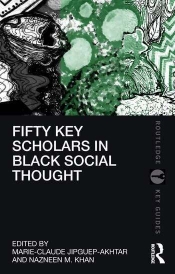ASU faculty, grad student contribute to new book on scholars of Black social thought

ASU photo
Released on Oct. 15, "Fifty Key Scholars in Black Social Thought" contains 50 chapters developed by 55 experts highlighting the oft-overlooked contributions of Black scholars to the field of sociology.
Among its contributors are Arizona State University School of Social Transformation faculty Mako Ward and Tracy Perkins, along with graduate student Nana Atakora Appiah-Padi.
Described as "a collaborative volume that uplifts and explores the intellectual activism and scholarly contributions of Black social thinkers," the book asks readers "to integrate the research of Black scholars into their teaching and research, and fundamentally, to rethink the dominant epistemological claims and philosophical underpinnings of the Western social sciences."
To learn more about the project and its significance, ASU News spoke to these contributors and co-editor Nazneen Khan.
Editor’s note: Answers have been edited for length and/or clarity.
Question: What are the theme(s) or message(s) conveyed in the book?
Khan: Literary and academic censorship of Black thinkers has long been a tool of oppression. This work protests the rising wave of anti-Black censorship and, we hope, will serve as a resource for intellectual activism and deepened commitment to curricular transformation. The message conveyed in this book is teach, read and continue building insurgent sociology.
Q: With 50 authors/editors, how did each person contribute; what was the process?
Khan: “Fifty Key Scholars in Black Social Thought” is comprised of an introductory chapter in addition to 50 chapters, each focusing on a groundbreaking Black scholar. The majority of chapters were sole-authored, but a few of them were written by multiple authors. In total, 55 individuals contributed to this collaborative volume!
Q: Were there any personal experiences or events that influenced your writing?
Get the book
“Fifty Key Scholars in Black Social Thought” is available for purchase here. Use code AFLY04 for 20% off.
Perkins: I was originally asked to write the chapter on the Combahee River Collective, but I ultimately switched to writing the chapter on E. Franklin Frazier instead. Writing about Frazier gave me a chance to improve my understanding of the period of Black intellectual history to which he contributed and its relationship to the sociology department at Howard University, where he was the longtime chair and where I later began my faculty career.
Ward: I was excited to engage (Ruha) Benjamin’s work and consider her contributions to the Black radical intellectual tradition. Her work is also guided by social justice ethics towards solutions, which, as a Black feminist justice studies scholar, appeals to me.
Appiah-Padi: A conversation with another ASU professor, Dr. Curtis Austin, reminded me that historical figures are often reduced to interpersonal drama, gossip and caricaturizations. So I tried to focus my writing on simply distilling the ideas and works of my thinker and less on the personal biography.
Q: Were there any challenges or obstacles you faced while writing, and how did you overcome them?
Perkins: (E. Franklin) Frazier was a prolific author, and I wasn’t in a position to read all of his work before writing about him, especially not for the short overview that appears in this book. Instead, I read everything about him and his work that I could find. Another challenge was writing about his many accomplishments and intellectual contributions while also being clear about the damage that he did, for example, by pathologizing Black women who are heads of their households.
Q: What advice would you give to aspiring writers?
Ward: Writing is a "doing" practice that requires daily engagement and ongoing personal reflection. For writers who are capturing experiences, knowledge and phenomena that have historically been exploited or framed from a dominant cultural vantage point, it’s important to have a community of support that allows you to be vulnerable, to question normative conventions and that pushes you to go deeper in the writing process.
Appiah-Padi: Try it! Simply try it with any idea you have. Lots of research ideas will fall apart when you put them on paper, but that's a good thing. Writing helps you see clearly where the gaps and assumptions lay.
More Arts, humanities and education
Illuminating legacy at ASU
In 2020, the ASU Art Museum unveiled a groundbreaking installation, "Point Cloud (ASU)," by renowned artist Leo Villareal. The art piece was given a permanent home on the Tempe campus in 2024 thanks…

Name change for ASU's Mary Lou Fulton Teachers College reflects college's mission
Arizona State University’s Mary Lou Fulton Teachers College has a new name: the Mary Lou Fulton College for Teaching and Learning Innovation.The name change, which will be completed in time for the…

Exhibit to feature artwork inspired by oral histories from Arizona's oldest botanical garden
Though it is Arizona's largest botanical garden and has been an established touchstone of the community for more than 100 years, many students in Arizona State University Professor Ellen…
